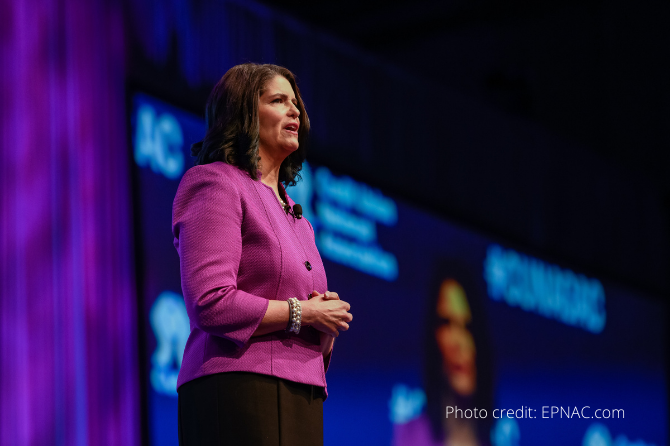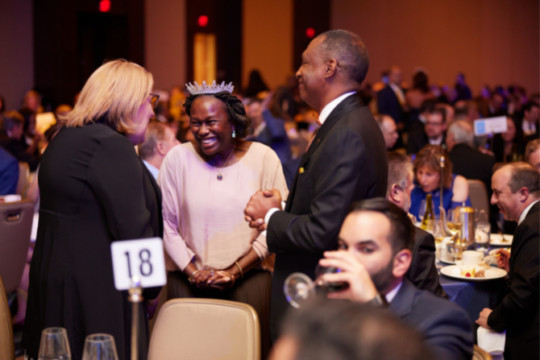“Human services is the reason credit unions exist”

A transcript of the address Gigi Hyland, executive director of the National Credit Union Foundation, gave to GAC attendees during the opening ceremony – Monday, February 28, 2022.
Hi! Oh my goodness, look around. Look at each other. We’re here in person. We’re here in 3D. How wonderful to see my credit union family in 3D, give yourselves a hand. So good to see you.
I’ve had the good fortune of standing on this stage for many, many years. I’ve had that honor and privilege. And it’s so wonderful to be with you again today.
I’ve often talked to you about financial wellbeing for all. And Jim [Nussle] did such an elegant job expressing why this is so important not only for a credit union person, but also for us as a credit union system.
And Antonio [Neves, event emcee] just read the mission of the National Credit Union Foundation. This is who we are. This is what we live and breathe every day. We have this deceptively simple little mission to be a catalyst to improve the financial lives of people. And to do that through credit unions.
And all of our work, our grants, our signature DE program, the aid we provide during disasters, our CUAid program. All of that is designed to improve peoples financial lives through you, through credit unions in our credit union system.
One of my favorite quotes comes from Charles Eikel Jr. who headed CUNA Mutual Group from the 1950s to the 1970s. And what he said was, “Human service really is the only reason for the existence of our credit unions.”
“Human service really is the only reason for the existence of our credit unions.”
At the Foundation we deeply believe and practice that every day. Because human service starts with empathy. With really understanding where a person is in his or her financial life and meeting him, her, them, exactly where they are right now in their financial life.
Human service looks like taking all of the really complex threads of peoples financial lives. Finances are hard, right? And leading them into a path of serenity and confidence, to financial wellbeing and to financial wellness.
Human service by credit unions is financial wellbeing for all. Let me give you some examples. And I risk offending those of you who are doing this work because I’m going to give you only five examples. Many of you are going to think “Well I do that work, too!” but just bear with me.
Human service looks like Members Credit Union in Connecticut. All of their staff, give them a hand, all of their staff are trained as financial counselors. And they spend their days serving their significant Hispanic community to help navigate the intricacies of our US financial system.
Human service looks like PSCU, who has looked inward and realized that financial health of employees is the starting point. They paid their lowest paid employees a living wage, and they provided resources of education to make sure that all of their employees are financially well.
Human service looks like SchoolsFirst Federal Credit Union in California. Working with Gallup. Yeah, woo, woo, wherever you are! SchoolsFirst work with Gallup to identify what are members financial aspirations, and making sure that serving them is infused throughout the entire organization. And then measuring the progress: how are we doing to actually improve peoples emergency savings? How are we doing to reduce debt? How are we doing to get want to be first time owners into houses.
Human service looks like Co-Op Solutions creating an entire Think Masterclass around financial wellness that gives personas around what people need in the context of payments, and how meeting those lifestyles can improve financial wellbeing for your members.
And last, but certainly not least, is the University Federal Credit Union in Texas. Who I’m quoting Heather McKissick now, my beloved Heather McKissick. Who had the notion of all notions in 2018. Where the entire board centered the strategy of the credit union on the social impact a credit union makes. And everything is judged on that, and every interaction with a member is deemed a financial health financial wellbeing interaction. Just give a hand of applause for all of that.
I give examples not to make any of you guys feel bad that you do this work. But I give you these examples to think. Because there’s so much good work that still needs to be done. Credit unions have 130 million memberships. 166 million people in this country are financially unhealthy. We have a lot of good work to do together. And so what’s next? What’s next?
Over the past two years the Foundation has collaborated with CUNA to have many, many, many meetings. Many convenings assisting leaders, credit unions, and researchers, and system partners, our leagues, our state credit union foundations, to think about how can we move the needle faster for credit unions – to really own financial wellbeing for all.
We know in our hearts that we do this work. But quantifying it, demonstrating it through numbers, is challenging. How do we think about post-pandemic finding ways to make sure that our culture, our cooperative culture, and why we are different from any other recommended financial institution? How do we leverage that with staff that you’ve had to hire remotely, who have never experienced the culture of a credit union in person? How do we do that?
So, all of these meetings and these convenings over the past two years have really resulted in three primary activities that you’re going to hear a lot more about from us, the credit union system, and CUNA. A foundation for system partners that we’re going to be working on for the next several years.
One is, we need a repository where we can put all of the work that I just mentioned as examples, into that repository. So that you can see what your peers are doing and you can share that information. There is no shortage of amazing work and amazing great ideas around financial wellbeing for all, but we need to share it together. We need to engage with each other and learn from each other.
So, building a repository that’s rich in tools and best practices and case studies, in ways to engage, is number one.
Number two is this idea of culture. How do we make sure that we up-skill our employees so they are ready to meet people where they are in their financial lives?
The world has changed with the pandemic. Everybody wants to do their finances on the phone. They want it now, they want the education at the same time. How do we meet them there? And how do our employees have the confidence and the know-how to be able to help people weather the difficulties and the challenges of navigating the very complex financial system?
Number three is about tracking the data and measuring at scale. How do we determine what success looks like? How do we combine, store and analyze data from across the credit union system to truly move the needle?
It’s really easy for me to Google any information I want about assisted care. My dad’s 85 years old and I can Google all of that information. But as I think about the financial obligations of caring for him if he needs care, gosh… I want my credit union by my side saying, “What are the options? Do I finance this? How do I think about the financial implications of taking care of a loved one who’s aging in a way that’s full of dignity and full of respect for his life?”
A whole different challenge from being 18 years old and wanting a car loan. I want my credit union by my side no matter what. That’s what this is all about.
Take one moment right now and just close your eyes. And I know it’s always weird to close your eyes in an audience, but I’m going to do it up here, so you’re okay. Close your eyes and think about a time in your financial life where you were stressed out. Where nothing was going right, where you had no confidence about how you were going to make the right decision. Or maybe you weren’t sleeping at night.
Think about that. Now, think about when you stopped having that financial stress, and I hope you stopped having that financial stress. Think about what that felt like, that relief, that sense of confidence, that sense of, okay, I’m going to be okay. I’ve got a plan.
That’s what our members are going through day in, day out, month in, month out, year in, year out. And this is our space.
So those three things I talked about, that’s the work ahead of us. And I’m so humbled and honored to have five leaders in the credit union system say, “This needs time, this needs talent, and this needs resources. It needs money.” To get this to work, to push the pedal to the metal and to accelerate it.
BCU, Redwood Credit Union, LGFCU, Coastal, along with CUNA Mutual Group have pledged $2 million to a new fund held at the National Credit Union Foundation called the FinHealth Fund.
This is a committed amount of resources that we hope you will contribute to for the next five years, to focus on those three things: to build a repository, to synergistically collaborate through all of our system partners to make sure that our employees have the skills they need to meet people where they are in their financial lives. And number three, to crack the data piece. To be able to quantify and to show demonstrably the needle that we move as credit unions on peoples financial lives.
Nobody can do this alone. I can’t do this alone. As stubborn and opinionated as I am, I cannot do this alone. I need you. Together we have to do this as a system. Credit unions, league partners, state foundations, system partners, CUNA Mutual, CUNA, all of you credit unions need to be behind us. Because this is the future of credit unions. This is what our members need. Together we’re so powerful.
Human service in the form of financial wellbeing for all is who credit unions are. This is us. We own this space. This is our DNA. Nobody can take that away from us. But we’ve got to work. We have to work to be able to now show demonstrably the needle we move for peoples financial lives.
I would love to, in five years, stand on this stage and be able to say that credit unions reduce the number of financially unhealthy people by this number. I would love to be able to do that. Because that’s our charter. That’s who we are.
Thank you for all you do. It is so good to see you. I can’t wait to celebrate with many of you tonight at the Foundation Dinner, get ready to get fancy. Thank you for all you do and for being part of my credit union family. Thank you for listening. Take care.

